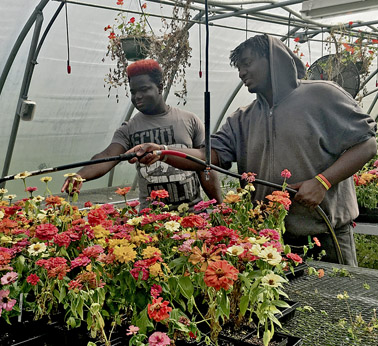KRISTINA ORREGO/Alachua County Today
L-R: Access Biology Program student Quandrick Johnson and Santa Fe High School senior and Academy of AgriScience student Willie Curtis work in the school’s land lab, which consists of the hydroponics unit, the shade house and the greenhouse.
ALACHUA – Santa Fe High School’s Academy of AgriScience and the Access Biology program give students the opportunity to work in a greenhouse at the school, growing various types of crops and flowers.
JoAnn Brady, who teaches horticulture at the Academy, said students grow vegetables like tomatoes, cucumber, squash, lettuce and cabbage, and flowers like celosias, marigolds, dahlias, gazineas and vincas.
Brady said the greenhouse is open to students in the agriculture education program of all different levels.
The Access Biology program is geared toward students with disabilities and gives them the chance to take a hands-on approach to learning biology with a focus on plants according to Ryan Pass, an ESE teacher for the program.
Students work in the classroom, the greenhouse, and in the garden to learn about raising vegetable plants from the seed until they produce, he added.
Pass said that his students benefit from working in the greenhouse by learning the importance of teamwork as well as their own individual responsibilities to make sure they complete their tasks in the one hour a day they have at the greenhouse.
“Some students are being exposed to plants, gardens, and greenhouses for the first time,” he noted. “Some students are getting their first taste of the various vegetables we are growing.”
The horticulture land lab consists of the hydroponics unit, the shade house and the greenhouse. The vegetables are grown hydroponically while the azaleas are grown in the shade house.
Brady said this is the first year that students have attempted to grow vegetables using the Verti-Gro Hydroponics system.
“It’s a mixture of water and fertilizer that flows to the top of [the] tubes and drips down into each one of the pots, “ Brady said. “There’s no water being wasted and there’s no water draining off the bottom.”
In addition to growing the plants themselves, the students also oversee the sales of the plants and track expenses. Anyone in the community can stop by the school between 9 a.m. and 3 p.m. to purchase plants in the agriscience department, Brady said
“We really encourage the public to come in and support the program because [that’s] the only way to keep producing these type of plants,” she said. “We have to buy the containers. We have to buy the media–the soil. And all of that costs money…By selling these, it just keeps our program going.”
She said that, along with teaching students employability skills, they also utilize math skills that are valuable in other aspects of life.
“When we’re figuring out landscaping, figuring out how many plants to put in an area–it’s all using math,” she said.
Brady also praised the Academy for its vet assisting program, as well as the exposure it gives students to different facets of the agricultural industry.
The school’s land lab, which covers about 19 acres, is used to tend 20 cows that produce calves each year, she said. Students work with these calves to eventually display at state and youth fairs.
“So they get the advantage of working with the cattle [and learn] about the beef industry, she said.
She stated that the program is also an excellent way for students to become involved in the National FFA program. Only students in agriculture education classes are eligible.
The FFA is a fantastic leadership organization, giving students the opportunity to compete in contests – from prepared public speaking to livestock judging – to visiting and touring different agricultural industries, she said.
“It’s skills that they will use in life no matter what profession they choose,” Brady said.
# # #
Email Korrego@
alachuatoday.com
Santa Fe High goes green
Tools
Typography
- Font Size
- Default
- Reading Mode


